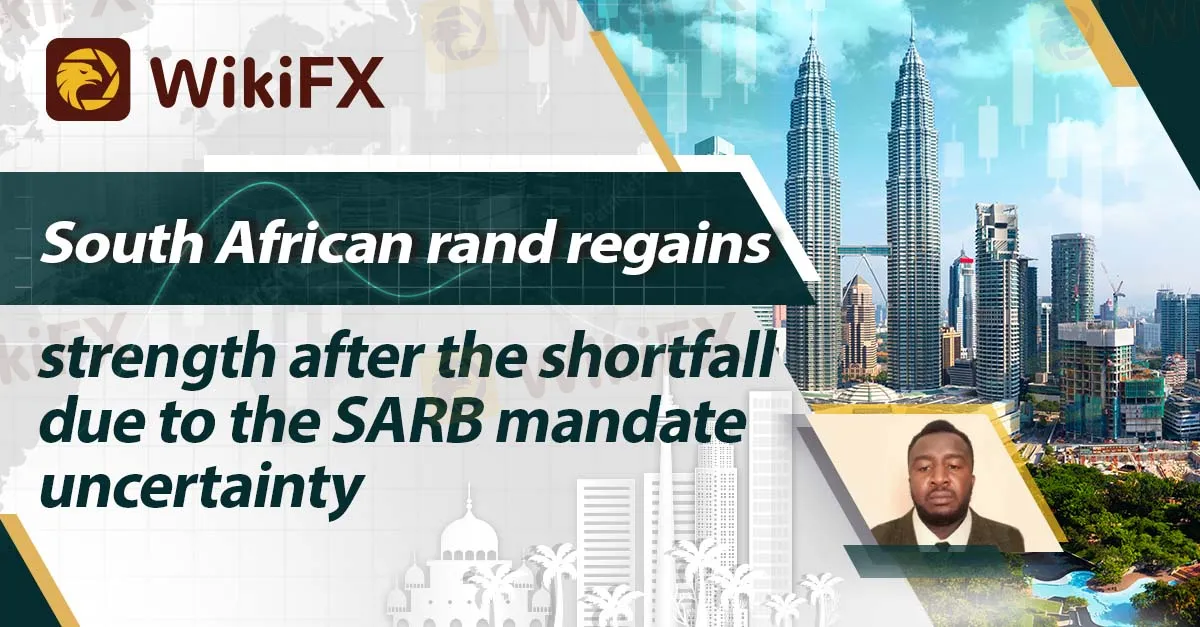简体中文
繁體中文
English
Pусский
日本語
ภาษาไทย
Tiếng Việt
Bahasa Indonesia
Español
हिन्दी
Filippiiniläinen
Français
Deutsch
Português
Türkçe
한국어
العربية
South African rand regains strength after the shortfall due to the SARB mandate uncertainty
Abstract:The South African rand has started the week stronger after the shortfall witnessed on Friday due to the uncertainties surrounding the SARB mandate.

By: Chime Amara

The South African rand regained ground on Friday after a brief period of uncertainty surrounding the mandate of the South African Reserve Bank (SARB).
The currency had weakened earlier in the week amid concerns about the future of the central bank's independence, as well as anticipation of the release of key US employment data.
However, the rand recovered after SARB Governor Lesetja Kganyago assured markets that the bank's mandate, which includes maintaining price stability and protecting the value of the currency, will not be compromised.
Further, the SARB governor assured investors that “the SARB remains committed to fulfilling its mandate and will continue to act in the best interests of the South African economy,”.
The rand's recovery came as the US jobs data, which was released on Friday, showed a stronger-than-expected increase in employment. This helped to boost investor confidence and contributed to a stronger demand for riskier assets, such as emerging market currencies.
Overall, the rand ended the day up against the US dollar, closing at 14.35 rand to the dollar, a modest but welcome improvement for the South African currency.
Analysts expect the rand to remain volatile in the coming weeks, as markets continue to assess the outlook for the South African economy and the central bank's monetary policy. However, the SARB's commitment to its mandate has helped to restore some stability to the currency.

Disclaimer:
The views in this article only represent the author's personal views, and do not constitute investment advice on this platform. This platform does not guarantee the accuracy, completeness and timeliness of the information in the article, and will not be liable for any loss caused by the use of or reliance on the information in the article.
Read more

The Hidden Checklist: Five Unconventional Steps to Vet Your Broker
Forex broker scams continue to evolve, employing new tactics to appear credible and mislead unsuspecting traders. Identifying these fraudulent schemes requires vigilance and strategies beyond the usual advice. Here are five effective methods to help traders assess the legitimacy of a forex broker and avoid potential pitfalls.

Doo Financial Obtains Licenses in BVI and Cayman Islands
Doo Financial, a subsidiary of Singapore-based Doo Group, has expanded its regulatory footprint by securing new offshore licenses from the British Virgin Islands Financial Services Commission (BVI FSC) and the Cayman Islands Monetary Authority (CIMA).

CFI’s New Initiative Aims to Promote Transparency in Trading
A new programme has been launched by CFI to address the growing need for transparency and awareness in online trading. Named “Trading Transparency+: Empowering Awareness and Clarity in Trading,” the initiative seeks to combat misinformation and equip individuals with resources to evaluate whether trading aligns with their financial goals and circumstances.

Malaysian-Thai Fraud Syndicate Dismantled, Millions in Losses Reported
The Royal Malaysia Police (PDRM) has received 26 reports concerning the Nicshare and CommonApps investment schemes, both linked to a major fraudulent syndicate led by a Malaysian citizen. The syndicate’s activities came to light following the arrest of its leader by Thai authorities on 16 December.
WikiFX Broker
Latest News
ASIC Sues Binance Australia Derivatives for Misclassifying Retail Clients
WikiFX Review: Is FxPro Reliable?
Malaysian-Thai Fraud Syndicate Dismantled, Millions in Losses Reported
Trading frauds topped the list of scams in India- Report Reveals
AIMS Broker Review
The Hidden Checklist: Five Unconventional Steps to Vet Your Broker
Russia to Fully Ban Crypto Mining in 10 Regions Starting January 1, 2025
YAMARKETS' Jingle Bells Christmas Offer!
Why is there so much exposure against PrimeX Capital?
Doo Financial Expands Regulatory Reach with Offshore Licenses in BVI and Cayman Islands
Currency Calculator


